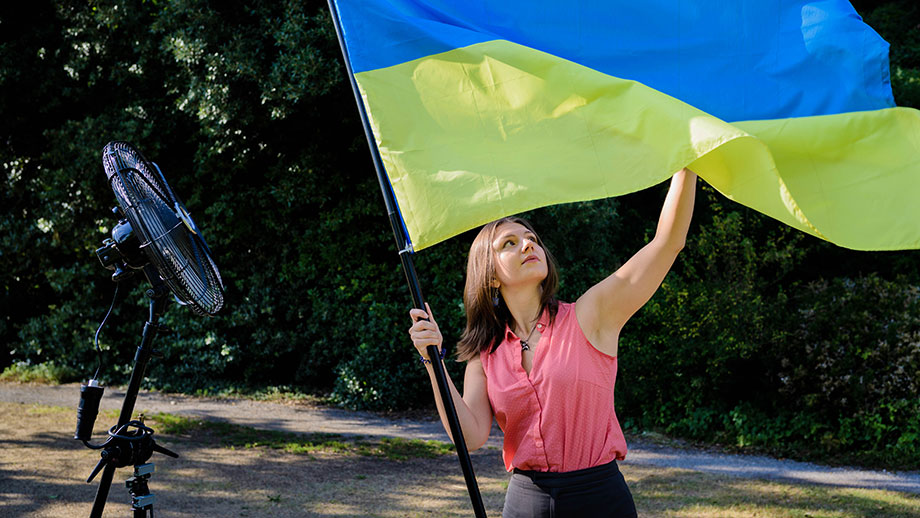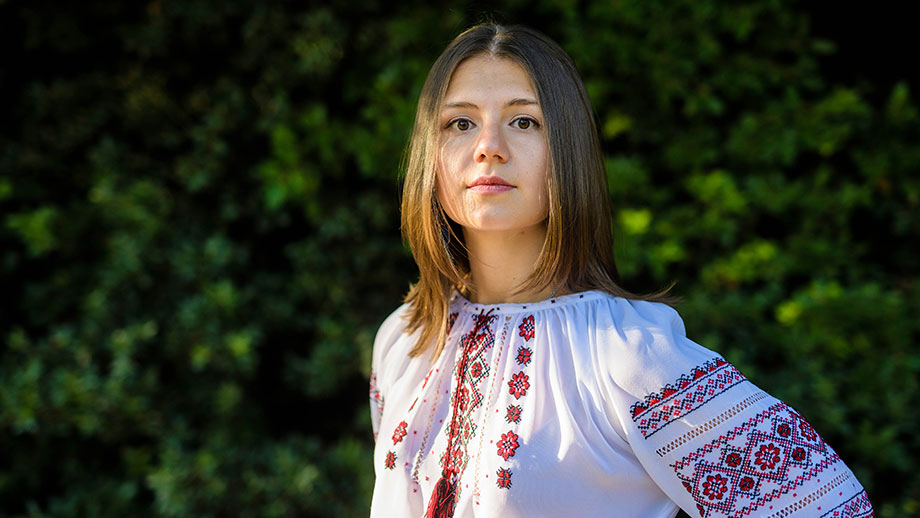Physics and War

What is it she loves so much about Kyiv? This is difficult for Iaroslava Bezshyiko to articulate. She’s a postdoc from the Department of Physics. Sitting in an office on Irchel Campus, she smiles shyly into her webcam. “In the end, Kyiv is my home – for me, the most beautiful city in the world!”
A few days before our online interview in summer 2022, Bezshyiko emails me a photo of the Ukrainian capital, situated on the hilly banks of the Dnieper. The image shows a city glowing resplendently in an array of golds and greens. Richly adorned towers and churches crowned with gilded domes are seen rising over thick canopies of chestnut trees. For a metropolis of three million, the center has an exceptional amount of natural space: a stroll (with Google Earth) through the old quarters of Kyiv shows tree-lined avenues in abundance, and several large parks in the city center.
Kyiv’s colorful past stretches back over 1,500 years. Destroyed several times by fires and wars, it has risen – like Phoenix from the ashes – from the tumults of its history time and time again. The present cityscape bears witness to its past: Soviet-era prefabricated structures stand alongside elegant Art Nouveau palaces, soaring new skyscrapers next to ornately embellished mansions, and bizarre-looking buildings of the Modern Age beside grand Baroque cathedrals.
A young country still evolving
It was against this background of old and new, of a constantly changing cityscape, that Iaroslava Bezshyiko was raised. Born in 1991 only a few months after the collapse of the Soviet Union, she and Ukraine practically grew up together. “When I think back, actually everything was always in flux, in upheaval, in a state of unrest,” the young scientist reflects. “That's why the Ukraine of my childhood differs so much from the Ukraine of my student days.” But Bezshyiko is keen to point out the positive aspects of the instability of her country, and of the fragility of the still young and independent state: “What is still growing, brings forth something new. Kyiv has come a long way over the course of my life. The city has truly blossomed before my eyes.”
New Normality
As a resident of Switzerland of seven years, Iaroslava Bezshyiko asked friends back home how life was feeling in summer 2022. “Normal” was the unanimous response. Except that for them, the definition of normality has changed beyond recognition. With many salaries palpably reduced, it’s now normal for grandchildren to go and live with their grandparents in the countryside. It’s now normal for young fathers to sit forlornly at the kitchen table waiting for their marching orders. It’s now normal to be able to distinguish between the different weapons of war by their booms.
“Most of my friends live from one day to the next,” Bezshyiko says dejectedly. Their plans have turned into unrealizable dreams. Their perception of time, their everyday life, their identity – everything has changed since the war began. The war has also changed Iaroslava. “I’ve become more reflective and more vulnerable.” She finds herself dividing her life into before and after.
Research at CERN
The particular research questions she is working on are difficult for laypeople to understand. Bezshyiko recognizes all too well the perplexed looks of non-physicists and has given up even trying to give any detailed explanations. Among other things, the postdoc is engaged in one of the four main experiments currently being conducted in the Large Hadron Collider beauty (LHCb) particle accelerator at the European nuclear research center CERN near Geneva, which is searching for anomalies beyond the Standard Model of particle physics. This all came about because recent measurements from the LHCb indicate that a new fundamental force could exist in addition to gravity, electromagnetic, weak and strong interactions.
Seeking new elementary particles
“I’m currently working on a study of leptons, a class of elementary particles that, along with quarks and gauge bosons, form the fundamental building blocks of matter. I'm investigating whether charged leptons differ only in their mass, as the Standard Model predicts.” Because analyses of this kind require enormous amounts of computing power, the physicist is also exploring the topic of heterogeneous computing systems, i.e., the creation and programming of unconventional hardware architectures. The advantage of such heterogeneous computing systems is that tasks can be executed quickly and energy-efficiently on an optimal hardware architecture.
Iaroslava Bezshyiko is extremely happy in her research group. “After all, the others are just as obsessed as I am. We live for science!” Bezshyiko brushes her long brown hair out of her face. For a moment, she seems relaxed. She has her work, come what may.
Physics in the family

The Ukrainian has been transfixed by the pursuit of knowledge her whole life. Born into a family of academics – her mother, father and grandmother conduct research at the Taras Shevchenko National University of Kyiv – Iaroslava was already listening to kitchen table conversations about the laws of nature and fundamental phenomena as a young child. While it’s nothing new for people to take over their parents’ professions, in a networked, globalized world, there are an infinite number of new professions and an infinite number of places in which to practice them. This makes it all the more unusual for someone to take up the same profession as their father and mother. But Iaroslava has inherited much from her family: not only her character and temperament, her talent and passion, but also two skills that are key to being a scientist: the need to question everything and the willingness to take risks and try out what at first may seem impossible.
At school, she took part in all the projects on offer – from researching the history of witches in Ukrainian folklore, to joining the school parliament and running the school newspaper – before deciding to follow her parents’ career. “Of course, their example had a strong influence on my choice of studies. Following them promised security and perspective.” That she, as a university professor, might one day be forced to leave her home country seemed unimaginable. “It was a good life,” she says today, as if it were gone forever.
At UZH thanks to a refugee grant
Bombs and missiles make no exception for universities. On the contrary, with its large-scale war of aggression, the Russian army is deliberately destroying research facilities in Ukraine. Shortly after the war began, conditions in Kyiv became life-threatening. “Day after day, I implored my parents to flee, I begged and cried,” says Iaroslava Bezshyiko, still visibly shocked months later. Her mother, physicist Larysa Golinka-Bezshyiko, finally managed to get on an evacuation train to Lviv and from there by cab to the border with Poland. There, Iaroslava was already waiting with a rental car. Her father remains in Kyiv, helping to procure and distribute materials and military equipment. They keep in touch daily.
Larysa Golinka-Bezshyiko is one of eight Ukrainian researchers at UZH who thanks to an SNSF Scholars at Risk grant can continue her academic work at a Swiss host institution. Workplace friendships and proximity to her daughter have made the refugee scientist’s situation more bearable.
Volatile Situation
But even though she has received great support from her new UZH colleagues, especially physics professor Nicola Serra, the stress and anxiety is unrelenting. “My mother was on the phone with one of her students at eleven at night yesterday to discuss his Bachelor’s thesis with him. He’s now a soldier on the front lines near Kharkiv.” Mother and daughter now try to assist their country from Zurich by promoting intercultural understanding, explaining the Swiss school system to young refugees and giving local teachers an insight into the schooling culture of their home country. “The feeling of being able to help is what keeps us going,” says Iaroslava.
The fact that so many Ukrainian scholars and young scientists have left the country worries Larysa Golinka-Bezshyiko. She desperately hopes that science, education and culture in Ukraine will survive. And that her husband will survive the war. Unfortunately, Russia’s military strategy is impossible to predict.
This article first appeared in the UZH Magazin, issue no. 3, 2022. This is a shortened version.